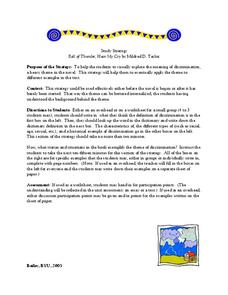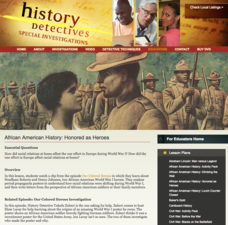Facing History and Ourselves
Emmett Till: Connecting the History of Lynching to The Murder
Though the murder of Emmett Till shocked 1950's America into turning attention to the racial crimes of the South, it was far from the first time racism had erupted into violence. High schoolers examine the killing in context with the...
Curated OER
Mississippi Trial, 1955: A Request Strategy for Questioning
Knowledge, comprehension, application, analysis, synthesis, evaluation. Class members use Bloom's taxonomy to craft six levels of discussion questions for Chris Crowe's novel, Mississippi Trial, 1955. Model questions from Chapter 3, a...
Teaching Tolerance
Introducing 'The New Jim Crow'
When Jim Crow Laws ended, the intent behind them did not. Academics read "The New Jim Crow Laws" and an interview from the author to understand how racism has not ended, but rather changed over time. The lesson explains how prejudices in...
Teaching Tolerance
Dismantling Racial Caste
It's time to end racism. The final installment of the series encourages scholars to consider what is needed to ended the racial caste system in the U.S. Young historians complete group discussion, written prompt, and a hands-on-activity...
Teaching Tolerance
Why Do We (Still) Celebrate Columbus Day?
What are we really celebrating on Columbus Day? The resource explores the narrative behind Columbus Day and ways for people to change the perception. Scholars also review vocabulary terms associated with the topic and how attitudes have...
Center for History Education
The Untold Story: The Black Struggle for Freedom during the Revolutionary War in Maryland
The American Revolution brought freedom to select groups and ignored others. An enlightening resource highlights the struggle of African Americans during the American Revolution and their efforts to escape slavery. Scholars analyze...
DocsTeach
WWI America: Babe Ruth's Draft Card
Even the Great Bambino wasn't above suspicion during World War I. An eye-opening activity explores America's greatest pastime through the lens of government officials during WWI. Academics examine Babe Ruth's draft card to understand how...
Center for History Education
Did Southern Free Men of Color Fight for the Ideals of the South?
Much of history is distasteful. Primary sources often reveal attitudes acceptable at the time that no longer are. But to understand controversial historical events, historians must examine primary sources that represent a wide variety of...
Novelinks
Roll of Thunder, Hear My Cry: Study Strategy
Readers of Roll of Thunder, Hear My Cry expand their understanding of discrimination by using the provided graphic organizer to record the definition of the word, characteristics of and different types of discrimination, as well as...
PBS
African American History: Honored as Heroes
To gain an understanding of the treatment of African American soldiers during World War I, class members watch an excerpt from the History Detectives film, Our Colored Heroes, and then examine three recruitment posters from that time...
Partners Against Hate
Building Community and Combating Hate
Put a little love in your classroom! Help middle school scholars understand differences among people and build a sense of community within their school through 10 well-organized lessons. Each unique lesson incorporates writing,...
Contra Costa Health Services
Youth Power Curriculum
Want to help foster teen leadership in your school? Pave the road to success with a well-designed unit that promotes planning skills, organization, and communication. Pupils participate in projects to gain an understanding of creating an...
PBS
Who Are Latinos?
What does it mean to be Latino? With an eye-opening lesson plan, pupils discover what it means to be Latino in the United States. They participate in classroom discussions, use graphic organizers, and watch a short video to help them...
EngageNY
Studying Conflicting Interpretations: Perspectives on Plessy v. Ferguson: Part 1
Scholars begin building background knowledge about Plessy v. Ferguson by watching a video about the landmark Supreme Court decision. They engage in discussions to analyze the case's importance and deepen their understanding of issues...
EngageNY
Studying Conflicting Interpretations: Perspectives on Plessy v. Ferguson: Part 2
The Plessy v. Ferguson case was influential in establishing segregation in the United States. Scholars continue reading the court's decision in the case, seeking to understand the key reasons the court came to its decision. Pupils also...
Teaching Tolerance
Using Photographs to Teach Social Justice | Exposing Anti-Immigration Sentiment
The debate about immigration reform continues. To gain a deeper understanding of the issues involved, class members first examine a photo of an anti-immigration rally. Groups then conduct an internet search for an image that presents an...
Just Health Action
Whose Backyard? Toxic Waste Management Meeting and Environmental Injustice
Toxic waste is a global problem. What to do with environmental hazards and where to put toxic waste is a global concern. To better understand current issues around toxic waste management and how current practices can lead to...
Teaching Tolerance
Thanksgiving Mourning
Two primary sources, a speech, and an article provide tweens and teens with different perspectives of the American Thanksgiving holiday. After analyzing Wamsutta James' suppressed speech and Jacqueline Keeler's article, class members use...
Teaching Tolerance
The War on Drugs—Mechanisms and Effects
The war on drugs doesn't have definite results. An interesting lesson examines the social, political, and economic effect of the war on drugs. Academics learn how the war on drugs has led to mass incarcerations and negatively affected...
DocsTeach
Analyzing a Letter from Jackie Robinson: "Fair Play and Justice"
Jackie Robinson was more than a baseball legend; he was an activist, too. An interesting resource explores Robinson's time in the military using primary sources. Scholars examine the racially inspired event that led to a court martial...
Digital Public Library of America
Beloved by Toni Morrison
Any classroom study of Toni Morrison's Pulitzer Prize-winning novel Beloved requires careful planning and scaffolding. A primary source set that includes a video, illustrations, photos of artifacts, and a broadside of the Fugitive Slave...
DocsTeach
Analyzing Jackie Robinson's White House Letter
Jackie Robinson: A hero on and off the field. An eye-opening activity focuses on Jackie Robinson's social activism during and after the civil rights movement. Academics read a letter addressed to President Nixon, answer questions, and...
Facing History and Ourselves
After Charlottesville: Public Memory and the Contested Meaning of Monuments
Are Civil War monuments a kind remembrance or a reminder of a dark past? The lesson plan focuses on the public's memory of the Civil War and the monuments that represent it. Young academics explore past efforts to change historical...
Angel Island Immigration Station Foundation
Conditions in China: Why Might One Leave Home Forever?
Primary source texts provide scholars with the background information they need to understand why Chinese peasant farmers were driven to emigrate. After underlining keywords, phrases, and/or lines in the texts, individuals craft a...

























